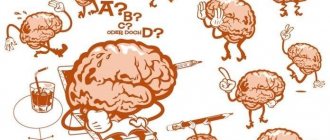Memory problems are one of the most common complaints encountered by neurologists and therapists. Most often, older people complain of memory problems; this symptom is less common in young people.
At a young age, memory problems are usually not associated with severe organic pathologies of the brain and are caused by chronic stress, lack of sleep, and incipient circulatory disorders in the brain (for example, due to osteochondrosis).
In older people, the most common cause of memory loss is incipient dementia .
If memory problems occur, you should contact a neurologist for a comprehensive examination. After establishing the cause of memory deterioration, the doctor will select a comprehensive treatment.
It should be noted that if you consult a specialist in a timely manner, the prognosis is favorable even with dementia, since in the early stages changes in the brain are often reversible.
In the later stages of the disease, restoration of the brain and lost functions is impossible, and treatment is limited to preventing the progression of dementia and symptomatic treatment.
Types of memory
Memory is one of the most important properties of the central nervous system, generalizing a complex of cognitive activity and HMF (higher mental functions) aimed at the accumulation, preservation and further reproduction of various skills, knowledge and abilities.
Memory allows you to accumulate information about any events in the environment and the body's reactions to these events. Also, thanks to memory, it is possible to reproduce and change this information multiple times.
The main types of memory are divided according to the following criteria depending on:
- from the sensory modality, memory is distinguished: visual (visual), motor (kinesthetic), sound (auditory), gustatory, olfactory, pain, eidic (long-term memorization of sensory information, based mainly on visual images, also eidic images can be supplemented by auditory, gustatory and other components).
- memory is separated from the content:
- figurative (connection of various images with previously occurring events, previously seen objects, formation of a way of thinking, figurative reproduction of what was previously seen);
- motor (memorization of motor automatisms, acquired skills, formation of automatic fine motor skills);
- emotional (memorizing emotions, reactions to events, people, connection of place, sound, smell, taste with emotions);
- social (memorizing the principle of social connections, the distinctive features of different people);
- topographical (memorizing the topography of the area, home, walking and tourist routes).
- from relation to time:
- prospective memory (remembering events planned for the future);
- retrospective memory (remembering previously occurring events).
- Depending on the duration of storage, memory is distinguished: ultra-short-term, short-term, long-term.
Features of temporary types of memory
Ultrashort memory, in turn, is divided into iconic (for visual perception) and echonic (for auditory perception). Ultrashort memory allows you to quickly process information coming from auditory and visual analyzers, and then quickly transforms into short memory.
For reference. Short-term memory allows you to remember a limited amount of information for up to 30 seconds. However, during subsequent analysis, the brain can extract additional information from this memory.
Short-term memory allows you to process mental processes, extract important information from sensory types of memory, evaluate the environment and perceive the world holistically.
Long-term memory belongs to the subconscious and allows you to store an unlimited amount of information. Long-term memory includes active information (used every day), passive (rarely used) and latent (used as a source of additional information).
Nutrition
Health, quality of brain activity, appearance, mood - all this depends on what a person eats. Proper nutrition has a direct impact on every aspect of life. It is very important that it be varied and complete. If you regularly eat unhealthy food, then after a few days you may feel a deterioration in your condition, as well as a decrease in your memory level.
The presence in food of all components necessary for the body guarantees that a person’s memory will work harder. Proteins, fats and carbohydrates are responsible for the functioning of the brain, which once again proves their importance. The diet should also include:
- Vitamins (A, B, E);
- Iron;
- Iodine;
- Magnesium;
- Zinc.
They help not only maintain memory, but also eliminate forgetfulness, which can arise out of the blue. But what foods exactly should you eat?
Meat, fish, seafood
According to doctors, upsetting vegetarians, it is necessary to eat meat. It is beneficial for the whole body. Meat improves memory because... it contains a large number of components that have a positive effect on the brain. The most useful: chicken, beef, veal liver. They contain a lot of vitamin B and iron, which are so necessary for the body.
Fish, especially sea fish, is rich in Omega-3 acid, which has a positive effect on brain function and the ability to remember any information. Equally important is seafood, which also has a major impact on overall health. You can get the maximum benefit from salmon, tuna, herring, oysters, shrimp, and mussels.
Vegetables
Cabbage and spinach contain a large amount of vitamins and acids that will help strengthen memory. They also reduce the risk of developing Alzheimer's disease. Tomatoes will have a similar effect due to the presence of lycopene. It removes dangerous radicals from the body, which prevents damage to neurons responsible for memory.
Garlic and onions are also very effective in improving attention and memory. They normalize blood circulation and help reduce the likelihood of deterioration in brain function in the future. You can use them at any age, limiting yourself to a couple of cloves or rings. It is especially important for older people to consume these vegetables.
Fruits, berries
Loving sweet fruits or berries is much healthier than many people think. They protect neurons, normalize blood circulation, saturate the body with all the necessary vitamins and minerals, help awaken interest in the world around them, and also increase learning ability, which makes them especially important for preschool children and adolescents.
Particular attention should be paid to the following fruits and berries:
- Red apples;
- Citrus fruits (lemons, oranges);
- Bananas;
- Blueberry;
- Blueberry;
- Grape;
- Black currant.
They can be consumed every day. However, it is worth considering that an excess of some components can cause discomfort or minor health problems.
It is also useful to include nuts, honey, eggs, milk, coffee, and sage tea in your diet in reasonable quantities.
Types of memory problems
Memory problems are divided into:
- amnesia (memory loss);
- hypomnesia (memory impairment);
- hypermnesia (rarely encountered abnormal memory exacerbation);
- paramnesia (distortion of memories, as well as mixing fantasies and reality).
Amnesia is most often temporary, with memory recovery occurring in chronological order.
Based on the type of memory loss, amnesia is divided into:
- dissociative - accompanied by loss of memories of traumatic events;
- retrograde - loss of memories of what happened shortly before the skull injury, stroke;
- anterograde - loss of memories of what happened after an injury or illness;
- fixation - the patient loses the ability to remember and reproduce current events that coincide in time with the injury or illness.
Memory impairments can also affect certain mnemonic operations. For example, when associative memory is impaired, the patient experiences problems making connections based on the similarity of objects or events.
For reference. Mnemonic processes are a set of mnemonic operations that provide the mechanisms of memory as a system: memorization, reproduction, preservation, forgetting of learned information.
If the ability to systematize is impaired, problems arise with establishing connections between actions or events. Violation of structuring leads to a loss of the ability to connect memories into a single picture.
Before treatment
Before you begin to treat the symptoms of memory impairment, you need to make a correct diagnosis and find out what is causing the patient's problems. To do this, you need to get more information about his health:
- What diseases does he suffer from? It may be possible to trace the connection between the existing pathology (or suffered in the past) with the deterioration of intellectual abilities;
- Does he have a pathology that directly leads to memory impairment: dementia, cerebral vascular insufficiency, TBI (history), chronic alcoholism, drug disorders?
- What medications is the patient taking and is memory impairment associated with the use of medications? Certain groups of pharmaceuticals, for example, benzodiazepines, have side effects of this kind, which, however, are reversible.
In addition, during the diagnostic search, a biochemical blood test can be very useful, allowing one to identify metabolic disorders, hormonal imbalances, and deficiencies of microelements and vitamins.
In most cases, when searching for the causes of memory loss, they resort to neuroimaging methods (CT, MRI, EEG, PET, etc.), which help to detect a brain tumor or hydrocephalus and, at the same time, differentiate vascular lesions of the brain from degenerative ones.
There is a need for neuroimaging methods also because memory impairment at first may be the only symptom of a serious pathology. Unfortunately, the greatest difficulties in diagnosis are presented by depressive conditions, which in other cases force one to prescribe a trial antidepressant treatment (to find out whether there is depression or not).
Causes of memory problems
The main causes of memory impairment include:
- age-related memory impairment;
- dementia;
- cerebrovascular accidents;
- depression;
- lack of sleep, chronic fatigue, stress and prolonged overwork;
- alcoholism;
- Alzheimer's disease;
- moderate cognitive impairment (pre-dementia);
- multiple sclerosis.
Rare causes of memory impairment include normal pressure hydrocephalus, subdural hematomas, hypothyroidism, vitamin B12 deficiency, and HIV infection.
Prevention of memory loss
Bad mood - what to do and why it happens
What to do if there are already memory lapses? If they are not associated with serious diseases, you can do prevention yourself. What to do if memory deteriorates:
- Replenish the deficiency of vitamin B12 and thiamine. Group vitamins are found in large quantities in dairy products, liver, red meat and eggs. Fish and seafood are also rich in vitamin B12. Thiamine is found in legumes, potatoes and spinach. Bran and whole grain flour also contain thiamine;
- Improve your sleep. An adult should sleep at least 7 hours at night, when cell regeneration occurs. If a person sleeps little, he feels anxious, his attention deteriorates;
- Saturate the blood with oxygen: spend more time in the fresh air, engage in physical activity;
- Try new things. What a person already knows how to do does not force the hemispheres of the brain to work or the memory to strain. If a person's work involves logic and thinking, it is necessary to use the creative right hemisphere. You can draw or read literature.
Girl reading in nature
There are simple exercises that can improve memory and brain function:
- Remember more. Many people try not to overload their brains by writing an extra reminder or note. Memory works like muscles: the more load, the stronger it becomes. You can start with the simplest actions: remember the phone number, the name of the interlocutor, learn a poem. It is necessary to control not the quantity, but the quality of the information received;
- Shake up your brain. Simple actions such as walking around the room, finding something, or brushing your teeth should be performed with your eyes closed. At first it will be difficult, over time the brain will quickly turn on and adapt;
- Remember. You need to place an object in front of you that has details, for example, a vase or a painting. Look carefully for 1 minute, then close your eyes and remember all the details: color, shade, shape. The exercise can be repeated with auditory memory, trying to remember the words of the song;
- Focus on the little things. It is not necessary to set aside a separate time; this can be done on the way to work or home. You need to train your brain to notice small details around: a sign, an advertisement, a cat passing by;
- Find associations. It is easier to remember information by building an associative series. For example, the name of the interlocutor may be similar to the name of the actor.
The exercises can be performed by adults and young people. For children, it is advisable to turn them into a game, for example, invite the child to eat an apple with his eyes closed, and learn a rhyme together.
Note! Sometimes a person cannot remember something not because he has a bad memory, but because it is not interesting to him. You need to remember how information related to your favorite activity is remembered. If many terms, phrases and subtleties immediately pop up in your head, there are no serious problems with memory. This also applies to children: a small child will not do something that he does not like.
Why does a person lose memory?
The most common age-related memory impairments are caused by the aging of the body. As many people age, it becomes more difficult for them to remember new information, and their ability to learn and master new skills decreases.
Age-related memory problems lead to slower thinking and forgetfulness. It takes a person more time to remember the necessary information.
For reference. However, mental abilities are not affected (this distinguishes age-related memory problems from memory decline due to dementia, cerebrovascular accidents, or Alzheimer's disease).
Memory problems - what is the name of the disease?
Common causes of memory problems in old age are:
- moderate cognitive impairment;
- senile dementia;
- Alzheimer's disease;
Memory problems associated with mild cognitive impairment are accompanied by impaired short-term memory.
For reference. Problems with short-term memory mean that patients have difficulty remembering the content of a recent conversation, where they put their keys, what they ate for breakfast, and they forget about appointments.
At the same time, working memory is not affected. Patients can perform simple calculations and remember and reproduce short lists of items.
It should be noted that moderate cognitive disorders are considered to be the initial manifestations of damage to the cerebral cortex (most often against the background of chronic cerebrovascular accident). In the absence of timely treatment, mild cognitive impairment transforms into dementia.
For dementia
If a person is diagnosed with dementia, then in addition to memory problems, severe cognitive impairment and behavioral disorders are observed. Mental abilities are also affected.
In addition to persistent forgetfulness, patients experience significant difficulty naming familiar objects and organizing and planning their daily activities. Executive functioning is also impaired (a person is unable to pay his bills or prepare food on his own).
Also a common symptom of dementia is a change in personality, the appearance of previously unusual character traits, constant irritability, aggressiveness, anxiety, and moodiness.
In the later stages of dementia, a person may forget family and friends, not understand where he is, and forget his address and name.
For Alzheimer's disease
Memory problems in Alzheimer's disease progress gradually. At the beginning of the disease, the patient himself can realize and notice his problems. As the disease progresses, a person loses the ability to self-critically assess his condition.
For reference. The first manifestation of memory problems is constant forgetfulness. The patient may tell the same story over and over again, repeat an old joke, and forget about his promises and appointments.
This forgetfulness, as the disease progresses, often leads to patients forgetting to turn off the gas, iron, water, and close the doors.
Also, with Alzheimer's disease, the ability to learn new skills is lost (the patient cannot learn to use a new phone or open a new door lock).
As Alzheimer's disease progresses, memory problems become more severe. Patients forget their name, address, names and faces of loved ones, events that happened to them previously.
There is also indifference to others, sloppiness, lack of self-care, loss of interest in one’s own appearance (patients can walk around with unwashed hair for a long time (weeks), in dirty clothes. Gradually, the ability to self-care is completely lost.
For Parkinson's disease
When a person is diagnosed with Parkinson's disease, movement disorders come to the fore. Coordination of movements is impaired, unsteadiness of gait appears, and muscle tone increases. A characteristic symptom is a trembling of the fingers, reminiscent of “counting coins” or “rolling beads.”
For reference. Memory problems, as well as apathy and depressive disorders appear only in the later stages.
Since Parkinson's disease is not characterized by intellectual impairment and severe memory problems, if the patient has these symptoms, the presence of dementia (senile, Alzheimer's) should be suspected.
For multiple sclerosis
Memory problems in multiple sclerosis are combined with:
- decreased intelligence;
- behavior change;
- depressive states;
- tremor and paresis of the limbs;
- violation of superficial and deep sensitivity;
- the appearance of symptoms of dementia;
- cranial nerve palsies (most often the oculomotor, trigeminal, facial and hypoglossal nerves are affected);
- nystagmus (rhythmic horizontal vibrations of the eyeball);
- urinary incontinence;
- erectile dysfunction.
Spastic muscle pain and deterioration in well-being are also often observed after taking a hot bath or against the background of an increase in body temperature.
Where can you improve your memory in St. Petersburg
Where should you go if it becomes clear that memory impairment is affecting your quality of life and you urgently need to take action? Why did my memory deteriorate? A specialist neurologist at our Center for Neurology, Professor Zhulev, can answer these questions.
Make an appointment with a doctor using the phone number listed on the website. If you notice that your ability to remember dates, faces and other data has sharply deteriorated, then you need to undergo an examination and identify the reasons. Don't let your health take its course. If memory has sharply deteriorated, then this is a signal from the body about problems that have arisen, and the sooner the doctor diagnoses them, the better.
We are located in the Central district of St. Petersburg, the work schedule and map can be found in the Contacts section.
What to do if your memory has suddenly deteriorated
A sharp deterioration in memory can be observed against the background of:
- delirium (acute psychosis due to severe infections, intoxication, drug use or drug withdrawal syndrome);
- traumatic brain injuries;
- strokes (both hemorrhagic and ischemic ).
Attention. In this regard, with a sharp decrease in memory, especially combined with headache , vomiting, loss of consciousness, disorientation in space, paralysis or paresis, you should immediately consult a neurologist.
Diagnostics
If a patient has memory problems, acute delirium and stroke should first be ruled out. It also takes into account whether the patient has had traumatic brain injuries.
For reference. If acute conditions are excluded, an in-depth examination is carried out aimed at assessing the patient’s memory state, the state of his intelligence, the presence of cognitive impairment, depressive states or neuroses.
When examining young patients, it is clarified what their sleep and rest patterns are, and how often they drink alcohol.
Special cards are used to assess the patient's memory.
The patient must quickly examine the card and name the objects depicted on it (the order of memorization does not matter). Normally, you need to remember at least 2/3 of the images.
During the examination, it is important to identify specific signs that are characteristic of different types of dementia. For example:
- parkinsonian tremor and unsteadiness of gait characteristic of Parkinson's disease;
- inability to maintain balance or look up or down with progressive supranuclear palsy;
- choreiform movement disorders due to Huntington's disease;
- impaired fine motor skills and inability to maintain balance due to vitamin B12 deficiency.
For reference. Choreiform movements are involuntary, fast and sweeping, non-rhythmic movements that occur in different parts of the body.
A comprehensive assessment of the patient's mental status is also carried out. His ability to navigate in space and time, the ability to concentrate, the presence of problems with short-term and/or long-term memory, the presence of speech disorders or the ability to understand someone else's speech are assessed.
The patient is also asked to draw a simple picture, name objects in the room, or perform simple tasks.
Folk remedies
Many generations have proven the effectiveness of folk remedies to combat a huge number of diseases. They also managed to figure out what to do to improve memory. There are a large number of options for drugs that can be prepared at home from plant materials.
Clover
Clover tincture eliminates forgetfulness, reduces blood pressure, and relieves headaches. It’s easy to prepare: you need to pour the plant head up to the middle of the jar, fill it with vodka, close it, and leave it for two weeks. You should drink the tincture one spoon before going to bed. Course – 3 weeks. It can be repeated after a month.
Mint with sage
The tincture helps improve brain performance and strengthen memory. The recipe does not require any special skills: mix one tablespoon of crushed herbal leaves, add water (500 ml), leave for 12 hours. You need to take 50 ml one hour before meals. Course – 2 weeks. Afterwards you will need to take a break for 1 month.
Red rowan bark
A decoction of rowan bark helps improve the quality of memory, restore it, and also increase overall brain activity. You will need one spoon of bark, which should be poured with hot water, boiled for 10 minutes, and then left to infuse for 6 hours. You need to consume 20 ml of decoction three times a day. You can take it for a month twice a year.
Other folk methods
Home remedies for improving memory are not limited to clover, sage mint and rowan bark. Other food additives you can make:
- Tincture of elecampane root;
- A decoction of bergenia, oregano, raspberry leaves;
- Calamus root powder;
- Fresh cucumber juice (can be mixed with tomato juice);
- A mixture of carrot and beet juice;
- Blueberry juice.
All of them show high effectiveness in strengthening memory and eliminating regular forgetfulness.
It is important to consider that abuse of folk remedies can cause unpleasant side effects.
How to treat memory problems
Treatment depends on the underlying disease causing memory impairment. For example, if a patient has mild cognitive impairment, donepezil may be used.
For moderate and severe forms of dementia, NMDA antagonist drugs or Memantyl are used.
Donepezil, galantamine, rivastigmine, memantine and others are used in the treatment of Alzheimer's disease.
If memory impairment is associated with depression, a course of antidepressants is selected.
For mild memory loss in young patients associated with fatigue, nootropics and mildronate may be prescribed.
How to make short-term memory work at full capacity
There are two ways out.
First, reduce the number of distractions and thereby reduce stress levels. This will have a positive effect not only on memory, but also on all areas of life.
But sometimes this is simply not feasible. We cannot foresee when our boss will require an urgent report from us or when someone close to us will fall ill. And, to tell the truth, we usually even like the variety of information that is now presented online.
This means that the second option remains - to develop and strengthen your short-term memory.









